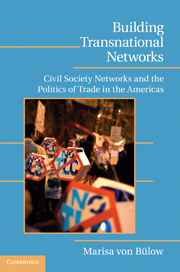Book contents
- Frontmatter
- Contents
- List of Figures
- List of Tables
- Acknowledgments
- Part One Civil Society Organizations and Their Pathways to Transnationality
- 1 INTRODUCTION
- 2 MULTIPLE PATHWAYS TO TRANSNATIONALITY
- Part Two The Politicization of Trade
- Part Three The Dynamics of Networks
- Part Four Organizational Pathways to Transnationality
- Part Five The Search for Ideational Pathways
- Main Abbreviations Used
- Appendix A Lists of Interviews
- Appendix B Social Network Questionnaire (United States)
- Bibliography
- Index
2 - MULTIPLE PATHWAYS TO TRANSNATIONALITY
Published online by Cambridge University Press: 05 October 2010
- Frontmatter
- Contents
- List of Figures
- List of Tables
- Acknowledgments
- Part One Civil Society Organizations and Their Pathways to Transnationality
- 1 INTRODUCTION
- 2 MULTIPLE PATHWAYS TO TRANSNATIONALITY
- Part Two The Politicization of Trade
- Part Three The Dynamics of Networks
- Part Four Organizational Pathways to Transnationality
- Part Five The Search for Ideational Pathways
- Main Abbreviations Used
- Appendix A Lists of Interviews
- Appendix B Social Network Questionnaire (United States)
- Bibliography
- Index
Summary
In 1997 a coalition of more than 600 organizations from seventy countries launched a transnational campaign that aimed at stopping the negotiations of the Multilateral Agreement on Investment (MAI). Debates about this treaty had begun a couple of years earlier within the Organisation for Economic Cooperation and Development (OECD), in view of the difficulties to negotiate a global agreement on investments at the World Trade Organization (WTO). The goal was to establish a set of rules on liberalization and investor protection, based on a broad definition of investment. Among the most contentious provisions included in the draft of the treaty were the possibility of compensation for expected profits in cases of expropriation, and a dispute settlement system that enabled investors to sue states before international tribunals.
Participants in the anti-MAI Campaign framed their resistance to the proposed agreement largely in terms that would resonate with domestic public opinion. More specifically, issues such as the defense of national autonomy and democracy were at the forefront of discourses. For example, in a joint statement, publicized by over a hundred CSOs from all over the world in 1997, it was argued that the agreement's intention “is not to regulate investments but to regulate governments” and that “the MAI did not respect the rights of countries … including their need to democratically control investment into their economies” (Alternate Forum for Research in Mindanao et al. 1997).
- Type
- Chapter
- Information
- Building Transnational NetworksCivil Society and the Politics of Trade in the Americas, pp. 20 - 36Publisher: Cambridge University PressPrint publication year: 2010



